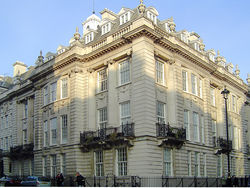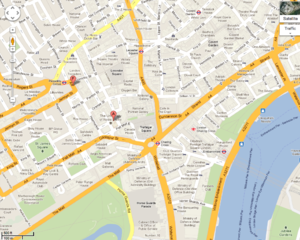London CPS Workshop
 |
Workshop on the Control of Cyber-Physical Systems |
 |
Workshop Scope and Purpose
Recent technological developments in sensing, communications, control and computation have created an emerging class of complex systems, called Cyber-Physical Systems. Cyber-Physical Systems are characterized by large numbers of tightly integrated heterogeneous components in a network, which may expand and contract dynamically. Cyber-Physical Systems are very common and are becoming increasingly ubiquitous. The control of such systems presents huge challenges and requires designs drawn from approaches such as those in traditional control, hybrid control systems, discrete event systems, and networked control. In addition, robustness, reliability and security issues for reconfiguring dynamical systems must also be addressed. This integration of different technologies and scientific domains presents new and challenging fundamental problems underlying the theoretical foundations for this class of systems.
This single-track workshop will bring together researchers in Systems and Control, interested in different aspects of Cyber-Physical Systems, in order to exchange research experiences and to identify the main scientific challenges in this rapidly growing research area. The participation is by invitation.
In the 2012 US NSF CPS PI meeting, Panos Antsaklis delivered a keynote address in the Science of CPS Session presenting an Introduction to Control Research Opportunities in CPS.
Final Report
The workshop organizers generated a final report, which summarizes the meeting and critical aspects of CPS and related research.
Schedule
Friday, October 19
Reception: 6:30-8:00pm
Saturday, October 20
Session 1: 8:30-9:00, Introduction and Welcome
Session 2: 9:00-11:00, Fundamentals
- Xenofon Koutsoukos, Resilient Cooperative Control of Cyber-Physical Systems (slides)
- Panos Antsaklis, Bill Goodwine and Vijay Gupta, Passivity and Symmetry in the Control of Cyber-Physical Systems (slides)
- Karl-Erik Årzén, Simulation of Cyber-Physical Control Systems (slides)
- Stefan Kowalewski, Architectural Support for Agile Control Design in CPS
- John S. Baras, Components, Compositionality and Architectures for Networked CPS (slides)
Coffee Break: 11:00-11:20
Session 3: 11:20-1:00, Applications
- Carlos Canudas-de-Wit, CPS in Intelligent Transportation Systems: The Grenoble South Ring Show Case
- Eduardo F. Camacho, Control of Solar Thermal Plants (slides)
- João Sousa, Coordination Challenges in Networked Vehicle Systems: Are We Missing Something? (slides)
- Malcolm Smith, Classical Network Synthesis Revisited
Lunch Break: 1:00-2:00
Session 4: 2:00-4:00, Panel Discussion
Moderator: Panos Antsaklis
Tentative Panel List:
- Alessandro Astolfi
- John S. Baras
- Sandra Hirche (slides)
- Karl Erik Johansson (slides)
- Alkis Konstantelos
- Francoise Lamnabhi-Lagarrigue (slides)
Coffee Break: 4:00-4:30
Session 5: 4:30-6:30, Control I
- Thomas Parisini and Marios Polycarpou, Towards Safe and Reliable CPS: A Learning-Based Distributed Fault-Diagnosis Approach (slides)
- Joerg Raisch, Control Hierarchies and Tropical Algebras (slides)
- Jan Maciejowski, Some New Developments in Model Predictive Control (slides)
- Kostas Kyriakopoulos, A Framework for Aperiodic Model Predictive Control (slides)
- Antonio Bicchi, Trading off Feedforward and Feedback, Remote and Local in the Control of Complex Interconnected Plants (slides)
Reception: 6:30-8:00
Sunday, October 21
Session 6: 9:00-11:00, Control II
- Arjan van der Schaft, Bisimulation Theory for Multi-Modal Physical Systems (slides)
- Claudio De Persis, Coordination Control in a Cyberphysical Environment (slides)
- Marika Di Benedetto, Analysis and Control of Networked Embedded Systems (slides)
- Eric Kerrigan, Number Representations for Embedding Optimization Algorithms in Cyber-Physical Systems (slides)
- Maurice Heemels, Event-Triggered and Self-Triggered Control Design with Guaranteed Performance (slides)
Closing Remarks and Discussion: 11:00-12:00
Participants
- Karl-Erik Årzén, Simulation of Cyber-Physical Control Systems (slides)
- Alessandro Astolfi, Model Reduction of Nonlinear Systems
- John S. Baras, Components, Compositionality and Architectures for Networked CPS (slides)
- Antonio Bicchi, Trading off Feedforward and Feedback, Remote and Local in the Control of Complex Interconnected Plants (slides)
- Eduardo F. Camacho, Control of Solar Thermal Plants (slides)
- Carlos Canudas-de-Wit, CPS in Intelligent Transportation Systems: The Grenoble South Ring Show Case
- Claudio De Persis, Coordination Control in a Cyberphysical Environment (slides)
- Marika Di Benedetto, Analysis and Control of Networked Embedded Systems
- Maurice Heemels, Event-Triggered and Self-Triggered Control Design with Guaranteed Performance (slides)
- Sandra Hirche, Resource-Aware Control for Cyber-Physical Systems (slides)
- Eric Kerrigan, Number Representations for Embedding Optimization Algorithms in Cyber-Physical Systems (slides)
- Xenofon Koutsoukos, Resilient Cooperative Control of Cyber-Physical Systems (slides)
- Stefan Kowalewski, Architectural Support for Agile Control Design in CPS
- Kostas Kyriakopoulos, A Framework for Aperiodic Model Predictive Control (slides)
- Jan Maciejowski, Some New Developments in Model Predictive Control (slides)
- Thomas Parisini and Marios Polycarpou, Towards Safe and Reliable CPS: A Learning-Based Distributed Fault-Diagnosis Approach (slides)
- Joerg Raisch, Control Hierarchies and Tropical Algebras (slides)
- Malcolm Smith, Classical Network Synthesis Revisited
- João Sousa, Coordination Challenges in Networked Vehicle Systems: Are We Missing Something? (slides)
- Arjan van der Schaft, Bisimulation Theory for Multi-Modal Physical Systems (slides)
Additional participants: Duarte Antunes, Tom Gommans, Alkis Konstantelos (slides), Francoise Lamnabhi-Lagarrigue (slides), Anthony Tzes, Richard Vinter and Zoran Vukic.
Registration
Registration information will be emailed to the participants approximately one month before the workshop. Registration will include participation in the workshop sessions, coffee breaks, receptions on Friday and Saturday evenings and lunch on Saturday.
Organizers
The organizers are:
- Panos Antsaklis, antsaklis.1@nd.edu, Electrical Engineering, University of Notre Dame
- Bill Goodwine, bill@controls.ame.nd.edu, Aerospace and Mechanical Engineering, University of Notre Dame
- Vijay Gupta, Vijay.Gupta.21@nd.edu, Electrical Engineering, University of Notre Dame
- Karl Henrik Johansson, kallej@kth.se, School of Electrical Engineering, KTH Royal Institute of Technology
Date and Location
The workshop will be on Saturday and Sunday, October 20-21, 2012. It will start Saturday morning and end at approximately noon on Sunday. It will be held at the London Centre of the University of Notre Dame. There will be a reception on the evening of Friday, October 19, 2012, at the Notre Dame London Centre.
|
University of Notre Dame in London |
 |
Acknowledgements
The organizers would like to acknowledge the support of the National Science Foundation; the Office of Research and Sponsored Programs, the College of Engineering, the Department of Electrical Engineering; and of the Brosey endowed chair of the University of Notre Dame .